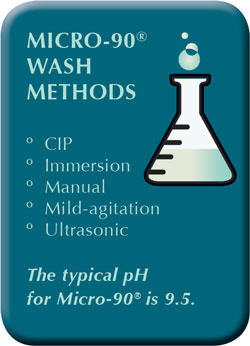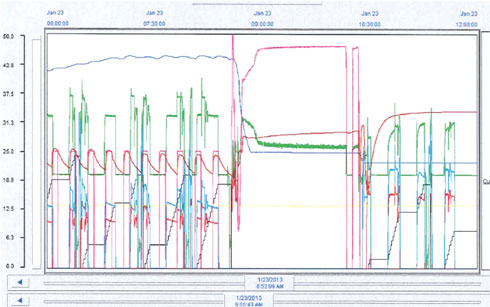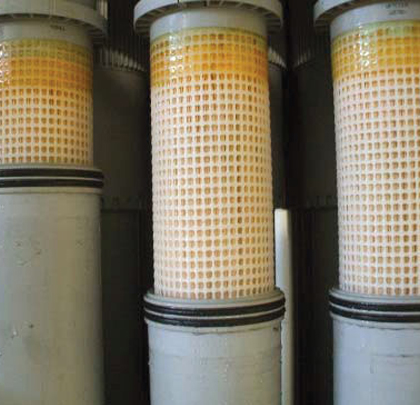Fargo, North Dakota, sits on the western bank of the Red River of the North and serves as the industrial, as well as cultural, epicenter for the Red River Valley. Although a comparatively small city, Fargo offers a representative snapshot of America’s industrial history—from westward expansion in the nineteenth century to the manufacturing boom of the twentieth century to today’s challenge of finding creative answers to ever more technical problems.
One of the city’s initiatives into that future is a partnership with Tharaldson Ethanol, a corn-to-ethanol distiller. As one of the country’s largest ethanol facilities, Tharaldson Ethanol requires a great deal of resources to produce their product. According to the city, the site of the ethanol plant was selected based on rail access, truck access, corn availability, and power availability, but water supply, however, was not given as much consideration.
To meet the water demands of the ethanol plant, the city planned to reclaim water through its wastewater treatment facility. However, this places the burden on the city of Fargo to filter and clean the wastewater before it can be used to distill corn into ethanol. The solution was found in a mild but powerful cleaner manufactured by International Products Corporation.
AN UPSETTING PROBLEM
The city of Fargo’s wastewater treatment plant has an auxiliary effluent re-use facility constructed specifically to produce reverse osmosis quality water destined for ethanol production. Tharaldson Ethanol requires approximately 1,000,000 gallons (3.8 million liters) of reverse osmosis water per day above the wastewater treatment plant’s normal processing volumes.
Fargo’s wastewater control systems manager, Jeff Hoff, manages the effluent re-use facility to ensure this additional volume is met on a daily basis. A key component of the effluent re-use facility is the ultra-filtration process, which uses 0.4μ polyvinylidene difluoride (PVDF) membranes with an upper pH limit of 10.0. These membranes are fouled primarily with petroleum sulfonates and bacterial secretions. Particularly in cold weather, the upstream BOD step has frequent “upsets,” where the bacteria die and secrete a water soluble foulant that adheres strongly to the PVDF polymer and significantly increases the trans-membrane pressure (TMP). These “upsets” must be resolved quickly to ensure a plentiful supply of pure water.

PASSING THE TEST
In order to determine the optimal cleaning regimen, Jeff systematically evaluated the performance of twenty different cleaners and hundreds of different combinations and concentrations, including commonly used commodities and many formulated membrane cleaners. Jeff discovered that International Products Corporation’s MICRO-90® was one of the top cleaners in his study.
Micro-90® stood out because the product performed better than all of the commodities and other formulated membrane cleaners, particularly on the bacterial secretions. What Jeff found most impressive is that Micro-90® worked effectively without the use of phosphates, silicates, and strong alkalis, at a membrane-compatible pH of only 9.5, and at a 0.3 percent concentration.
THE SYNERGY OF MICRO-90®
Micro-90® is a mild, yet powerful, multipurpose, alkaline cleaning concentrate that has long been used in laboratories, industrial applications, and critical cleaning processes. Micro-90® is a unique chelating detergent that contains ionic and non-ionic ingredients, which combine to produce a variety of cleaning actions. Micro-90® lifts, disperses, emulsifies, sequesters, suspends, and decomposes soils, then rinses away leaving the surface absolutely clean.
Micro-90®’s target soils include oil, grease, wax, tar, flux, particulates, hard water stains, and biological debris. Micro-90® is highly effective at defouling filter membranes and can be validated in critical cleaning applications.

A MODEL FOR THE FUTURE
Micro-90® has been in use at Fargo’s effluent re-use facility since October 2010. Some of the original PVDF membranes are still used and continue to see significant TMP drops after cleaning with Micro-90®. Although the bacterial upsets cannot be prevented, their fouling can be resolved in a predictable manner with the use of Micro-90®.
Since the initial use of Micro-90®, the effluent re-use facility design engineers have recommended the cleaner to other similarly designed effluent re-use facilities nationwide because of the product’s effectiveness, safe profile, compatibility, and economical cost per use. Once again, be it the prospectors or auto workers of the city’s past or the designers and engineers of the city’s future, Fargo continues to serve as a proving ground for innovative ideas that others can follow. ■
_________________________________________________________________________
ABOUT THE AUTHOR
Thomas McGuckin is the vice-president of research, quality, and safety for International Products Corporation (IPC). IPC manufactures specialty cleaners and temporary assembly lubricants at their ISO 9001-Certified facility in Burlington, New Jersey. For more information about Micro-90®, visit www.ipcol.com, or call 609.386.8770.
_________________________________________________________________________
MODERN PUMPING TODAY, April 2013
Did you enjoy this article?
Subscribe to the FREE Digital Edition of Modern Pumping Today Magazine!
![]()


